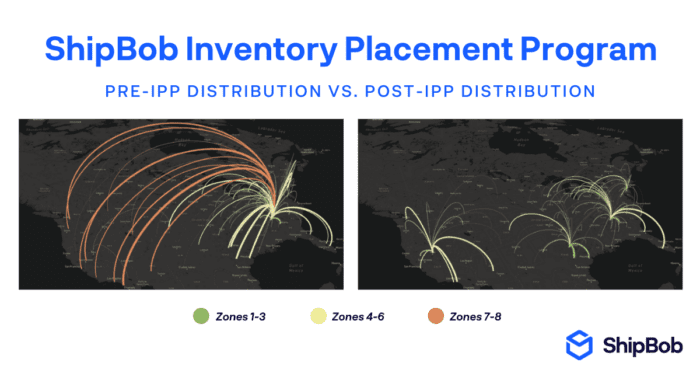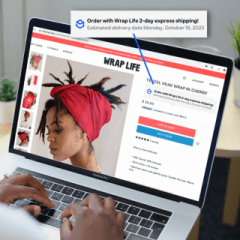Table of Contents
** Minutes
Why discreet packaging and shipping are important
In today’s world, privacy and security are top concerns for many. In fact, 9 out of 10 Americans consider their online privacy to be an important issue. But what about real-world privacy?
Consumers don’t want to broadcast their personal purchases for their neighbours to see. Whether it’s sensitive items like health products, personal care items, or other private purchases, the need for discretion extends beyond the digital world and into the physical act of ecommerce shipping.
That’s where discreet product packaging comes into play. Discreet packaging ensures that a customer’s personal purchases are kept confidential from the moment they leave a warehouse until they arrive at their doorstep.
In this article, we’ll cover the ins and outs of discreet packaging and shipping, why it matters, examples of how it’s done, and how ShipBob can help.
What is discreet packaging?
Discreet packaging refers to using plain packaging materials to ship products without revealing any information about the sender or the contents inside. This approach is particularly important for companies selling high-value products or items that customers may not want to publicly display. By using custom packaging that lacks branding or identifying markers, businesses help protect their customer’s privacy and ensure the confidentiality of the shipment.
Discreet packaging serves two primary purposes:
- Privacy protection: The exterior of the package doesn’t reveal the nature of the contents, safeguarding the customer’s purchase from curious eyes.
- Security: Unmarked packaging can also help reduce the risk of theft, as the package doesn’t appear valuable or attractive to potential thieves.
Examples of discreet packaging
There are many types of packaging options that businesses can use, depending on the size, weight, and fragility of the product. The choice of packaging often depends on the types of products being shipped, such as small electronics, personal care items, or luxury goods. Here are a few examples:
Plain cardboard boxes
One of the most commonly used forms of discreet packaging is the plain packaging design of a simple cardboard box—free of any logos, colours, or identifying features. These boxes are typically brown or white and offer excellent protection for a wide variety of products.
Unmarked & tamper-proof poly mailers
Poly mailers are flexible, lightweight, and provide a high level of privacy since they are typically unmarked. They often have tamper-evident seals to ensure that the package hasn’t been opened during transit. These are frequently used for clothing or soft goods and offer a cost-effective option for businesses looking to maintain a low shipping profile.
Padded envelopes
For businesses shipping smaller items like electronics, jewelry, or cosmetics, padded envelopes can provide both protection and privacy. These envelopes are often lined with bubble wrap or foam filler to ensure the items inside are well-protected, while the unmarked exterior keeps the contents discreet.
Neutral return labels
In addition to unmarked packaging, another important element of discreet shipping is using a neutral return address or sender information on the shipping label. Instead of using the company’s name, the return address might list a generic business name or fulfilment centre address, avoiding unwanted attention.
Plain shipping tapes
Even small details like the tape used to seal a package can play a role in discretion. Many companies opt for plain, unbranded tape to further ensure the package doesn’t draw attention.
How discreet shipping works
Discreet shipping encompasses more than just the packaging materials used—it also involves how orders are processed, labelled, and handled throughout the ecommerce fulfilment journey.
To ensure a truly discreet shipping and handling process, companies must focus on several key aspects:
- Neutral packaging: As mentioned, the packaging itself should be plain and unmarked. This includes using plain shipping boxes, mailers, or envelopes without branding or logos.
- Neutral shipping labels: The shipping label should not reveal the contents of the package. This includes using a neutral return address, such as a third-party logistics provider (3PL) or fulfilment centre, rather than the company’s actual name or industry-related terms.
- Secure order handling: The entire fulfilment process must prioritize confidentiality. This includes training fulfilment staff to ensure that packages are handled carefully and discreetly throughout the picking, packing, and shipping stages.
- Shipping methods: Some shipping couriers may offer specific shipping options labelled as “discreet shipping”. Additionally, businesses should calculate shipping costs carefully to ensure that discreet packaging doesn’t lead to unexpected fees for the customer.
- Tracking and notifications: Businesses may also consider using neutral language in tracking updates and notifications, so customers can receive information about their shipments without revealing sensitive details about the contents.
Why discreet packaging and shipping are important
Discreet packaging and shipping are vital for businesses dealing with sensitive or personal items, as they play a key role in building trust. Offering generic packaging shows customers that your ecommerce business values their privacy, helping to foster loyalty and repeat business.
Privacy concerns
Consumers today are more privacy-conscious than ever. In an era where data breaches, surveillance, and privacy violations are top-of-mind, the physical security of purchases is an extension of a customer’s personal privacy. Some customers may be hesitant to make purchases if they believe the packaging will reveal too much about what’s inside.
For instance, individuals may share a living space with roommates, family members, or partners, and they might not want others to know about the products they are purchasing. This is particularly true for items related to health, wellness, or personal care. Discreet packaging addresses these privacy concerns, ensuring that the customer’s order remains confidential.
Business types that benefit from discreet shipping
Certain industries rely heavily on discreet packaging to meet the needs of their customers. Here are some examples of businesses that benefit from discreet shipping:
- Health and wellness retailers: Companies selling over-the-counter medications, supplements, or medical devices often need to use discreet shipping to protect customer privacy.
- Adult product retailers: For businesses selling intimate goods or adult products, discreet packaging is often a critical part of the customer experience. Ensuring that packages are unmarked and confidential helps maintain trust and protects the customer’s privacy.
- Pharmaceutical companies: Discreet shipping is essential for pharmaceutical companies that sell prescription medications or medical products online. Customers expect their health information to remain confidential.
- Luxury and high-value goods: Discreet shipping can also be important for companies selling luxury items. Unmarked packaging reduces the risk of theft by keeping the value of the package hidden.
- Beauty and personal care brands: For companies selling skincare products, cosmetics, or grooming tools, discreet shipping is important for customers who value privacy regarding their personal care routines. Many customers prefer not to broadcast their beauty purchases, especially for sensitive skin treatments or specialized care products.
- Cannabis and CBD retailers: With the growing popularity of cannabis and CBD products, these businesses often rely on discreet shipping to protect customer privacy and avoid potential stigma. Discreet packaging helps ensure that customers can confidently receive their orders without drawing attention to the nature of the products.
How ShipBob ensures/supplements discreet shipping
ShipBob offers a range of shipping services designed to cater to businesses that prioritize confidentiality. With options for both domestic and international shipping, ShipBob ensures that packages are discreetly handled no matter where they’re going, maintaining customer privacy throughout the entire order fulfilment process.
Package & unboxing customisation suite

ShipBob offers a customisation suite that allows businesses to personalise their packaging while still maintaining discretion. This includes unbranded boxes and packaging inserts, so the exterior of the package remains neutral while the unboxing experience can be customised to meet brand standards. Businesses can use this suite to provide subtle branding on the inside of the package, without compromising the discreet nature of the shipment.
Inventory Placement Program (IPP)

ShipBob’s Inventory Placement Program (IPP) helps businesses optimise the distribution of their products across multiple fulfilment centres, minimising the distance packages need to travel. This reduces shipping zones crossed and ensures quicker deliveries with fewer shipping labels and stops along the way, ensuring packages spend less time in transit.
Liquid-efficient warehouse management system (WMS)
ShipBob’s warehouse management system (WMS) enables efficient order processing and inventory control. This system ensures that orders are handled accurately and that specific instructions related to discreet shipping are followed. By minimising errors, ShipBob ensures that packages are discreet from start to finish.
Global reach and 2-day express shipping program

ShipBob’s global fulfilment network and fast 2-day express shipping help businesses reduce the time packages spend in transit. Quicker shipping times not only enhance the customer experience but also help ensure that packages are delivered discreetly and efficiently.
Discreet shipping FAQs
Here are answers to commonly asked questions about discreet shipping.
Is discreet packaging legal?
Yes, discreet packaging is legal as long as it complies with postal and shipping regulations. Businesses must ensure that the packaging still meets shipping requirements (such as proper labelling) while keeping the contents private and unmarked.
How can I get discreet packaging for my business?
To get discreet packaging for your business, you can work with a third-party logistics (3PL) provider like ShipBob that offers customisable packaging options. You can also source plain boxes, poly mailers, or other unbranded materials directly from packaging suppliers and request neutral labelling for shipments.
Why would I use discreet packaging in ecommerce fulfilment?
Discreet packaging is important for protecting customer privacy, especially for businesses selling sensitive or personal products. It helps build trust, reduces the risk of theft, and ensures compliance with privacy regulations in certain industries like healthcare and wellness.
What are some examples of discreet packaging?
Examples of discreet packaging include plain cardboard boxes, unmarked poly mailers, padded envelopes, and plain tape. These materials are typically free of branding or logos, keeping the contents of the package private.








